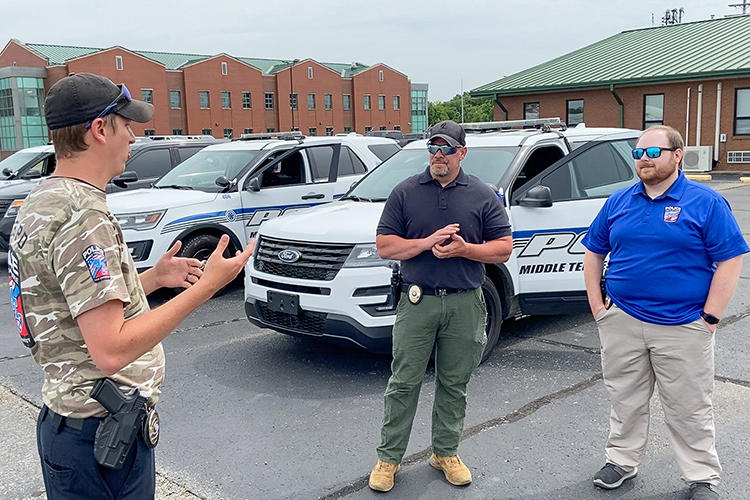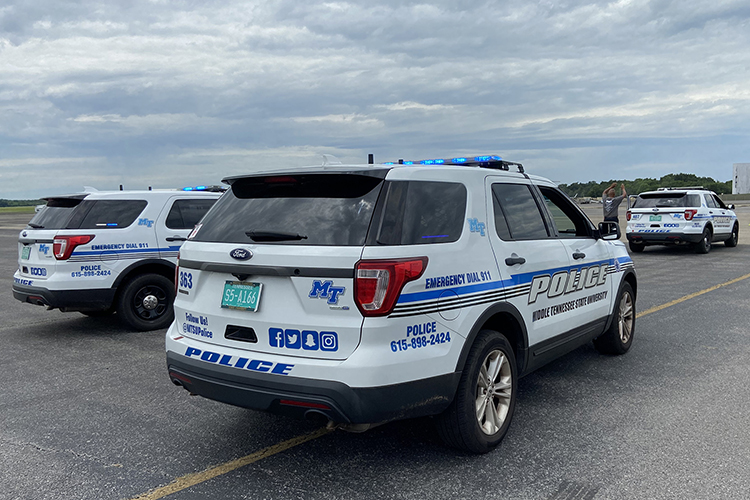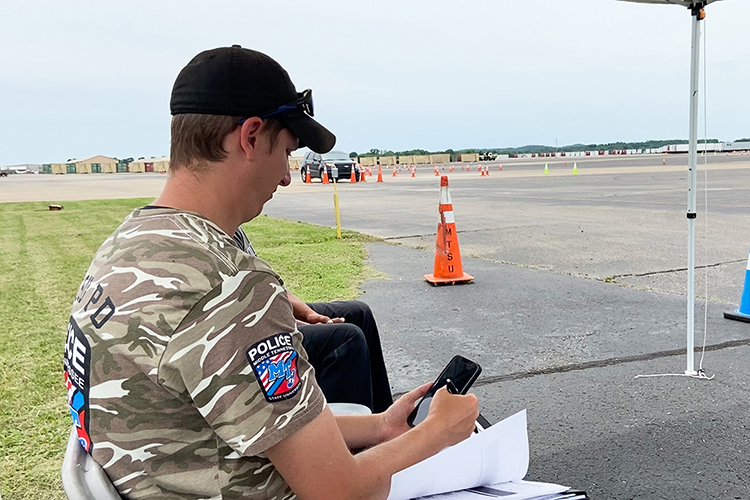
Line-of-duty motor vehicle collisions are the leading cause of injury, disability and fatality for police officers, which is why MTSU Police take annual Emergency Vehicle Operations Course training and recently finished the most recent course.
Lt. Andrew Bennett, one of the department’s three vehicle safety trainers, said the training is so important because officers drive their vehicles every shift on a campus full of pedestrians and commuters, so safety is critical for not only the officers but for the 25,000-plus campus community of students, faculty, staff and visitors.
“If you’re assigned to patrol, you’re in your car almost every shift and for a large portion of your shift,” Bennett said. “The vehicle is an integral tool of the job, and during emergency and nonemergency situations, officers need the skills to use it to patrol or arrive to a scene in a fast and safe manner.”
Known as EVOC training, officers completed the full-day course led by Lt. Bennett, Master Police Officer Leroy Carter and Lt. Walter Spain at the Smyrna Airport in Smyrna, Tennessee.
State mandate requires officers to take a minimum of two EVOC training hours and pass a comprehensive examination annually. The MTSU Police Department, however, goes above and beyond the minimum training requirement.
Each year officers take an eight-hour course — quadruple the required amount — and complete a rigorous, timed obstacle course.
Bennett said officers heavily benefit from this extended training, especially the practicum portion, because serving and navigating campus is a unique challenge.
“MTSU is like a small city in and of itself packed into about 500 acres,” he said. “There are pedestrians, cyclists, construction, tight parking lots, one-way streets, roundabouts, dead ends and more to navigate. We have to operate in this highly congested area, and, in an emergency, we need to be able to navigate the campus environment in a fast manner while also being safe.”

Officer and course instructor Carter said putting himself and his patrol vehicle through the stress of the course makes him better prepared for emergencies.
“Doing the course like this Emergency Vehicle Operations Course, I know if I have to respond to an emergency, I know my limits,” Carter said. “I know the car’s limits. I know I’m able to arrive safely to my scene or wherever I’m going to.”
Lt. Jacob Wagner said the course highlights that emergency vehicle operation is about a lot more than just driving fast.
“A lot of people think it’s all high-speed driving, but I think a big portion of the emergency vehicle operation course is the fact that you have to drive very precisely,” Wagner said. “Common driving issues that people have are backing up, pulling into small parking spaces. We practice that, and there are time and speed elements incorporated into it that makes it much more difficult, and I think that’s a huge benefit for officers to come out and practice in the real world (environment).”

Training also covers department vehicle protocols in addition to emergency operations. It includes the physics of driving, vehicle safety checklists, vehicle maintenance and required supplies. Officers carry lifesaving medical equipment as well as basic tools for solving vehicle issues — being locked out of a car or a dead battery — in their patrol vehicles at all times.
Bennett and the other officers know their patrol vehicles are highly visible symbols traveling around campus, that the community is watching their actions.
“Students, faculty and the campus community see MTSU police vehicles every day, and we want to inspire confidence in our work,” Bennett said. “The department strives to serve the campus community and train its officers at the highest level.”
To stay up to date with campus safety information, follow MTSU Police on Twitter, Instagram and Facebook.
— Stephanie Barrette (Stephanie.Barrette@mtsu.edu)

COMMENTS ARE OFF THIS POST